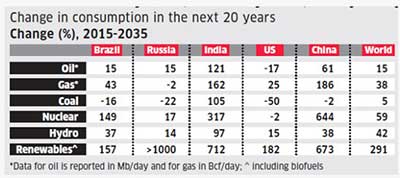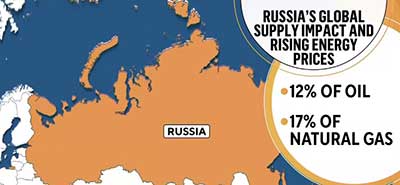Relevance: GS-2: Bilateral, Regional and Global Groupings and Agreements involving India and/or affecting India’s interests. Effect of Policies and Politics of Developed and Developing Countries on India’s interests, Indian Diaspora.
Key Phrases: Nord Stream 2 gas pipeline, Severe sanctions, ONGC-Videsh, Nuclear energy co-operation, Transnational, Strategic storage,
Why in News?
- Russia’s invasion of Ukraine spells higher prices at the pump for consumers worldwide. Oil prices surged past $100 a barrel for the first time since 2014 after Russian President Vladimir Putin ordered a full-scale military assault on Ukraine, prompting widespread international condemnation.
- Despite this, US President Joe Biden announced sanctions against a firm building the $11bn Nord Stream 2 gas pipeline, which is not yet in operation. Biden has vowed to impose further “severe sanctions” on Moscow shortly in coordination with allied countries.
- What does the Russian invasion of Ukraine mean for India’s energy security? Is India in a comfortable position? Can India turn this situation to its advantage or has India, yet again, missed the bus, on ensuring fuel secure supply, particularly gas.
Background:
- Russia is the world’s third-biggest oil producer and second-biggest producer of natural gas, ranking among the top energy suppliers to the US and China, the world’s top two economies.
- Energy sector is an important area in Indo-Russian bilateral relations.
- In 2001, ONGC-Videsh acquired a 20% stake in the Sakhalin-I oil and gas project in the Russian Federation, and has invested about US$1.7 billion in the project.
- Kudankulam Nuclear Power Project with two units of 1000 MW each is a good example of Indo-Russian nuclear energy co-operation.
- India has been impacted by the US sanctions against Iran which have now reduced Iranian crude oil exports to almost zero. Growing at the fastest pace in the world, India’s oil demand is projected to reach 10 million barrels per day by 2030 from the current demand of 5.05 million barrels per day.
Growing energy demand of India:
- The India Energy Outlook 2021 – a special report in the IEA’s
World Energy Outlook series – examines the opportunities and challenges
faced by the planet’s third-largest energy consuming country as it seeks to
recover from the Covid-19 crisis.
- India is set to experience the largest increase in energy demand of any country worldwide over the next 20 years as its economy continues to develop and bring greater prosperity to its citizens.
- India’s energy consumption is set to grow 4.2% a year by 2035, faster than that of all major economies in the world, according to BP Energy Outlook.

Impacts of sanctions:
- The crisis in Ukraine is expected to push gas prices even higher globally. For net oil importers, prices will increase significantly.
- The existing economic punishments, and any to come, will put more pressure on the global supply chain.
Problems for India:
- Delaying of project: A late mover in setting of strategic storage
for crude oil, similarly, it has also dragged its feet on transnational
pipeline networks for ferrying gas.
- Critics say India by now should have had a transnational gas pipeline network flowing gas into its territory.
- The ambitious Iran-Pakistan-India gas pipeline has got lost in transit, another major project, Turkmenistan-Afghanistan-Pakistan-India (TAPI) natural gas project for import of gas to India from Turkmenistan through TAPI pipeline, also seems to be hanging fire.
- Increased demand for natural gas: The Ministry had recently
informed the Lok Sabha that the government had set a target to raise the
share of natural gas in the energy mix to 15 per cent by 2030.
- The share of natural gas in primary energy mix has increased from 6.3 per cent to 6.7 per cent from 2020 to 2021.

What is the next step?
- Considering the changes in the global energy market, GAIL is discussing
the terms and conditions with Turkmengas for enhancing the marketability of
the pipeline gas to be received from Turkmenistan.
- GAIL is the Government of India's nominee in the TAPI natural gas project for import of gas. The pipeline, when constructed, is expected to carry 90 mmscmd (million standard cubic metre per day) of natural gas, of which India will receive 38 mmscmd.
Conclusion:
- Russia is not the only supplier, but ferrying gas through pipelines is a more secure and cost-effective option. Shipping is more expensive with added costs including the insurance cost, which is huge. Therefore, it is time for India to change its game plan and look at transnational networks more seriously.
Sources: Economic Times The Hindu BL
Mains Question:
Q. In the recent wake of Ukraine-Russia conflicts, analyse its impact on India’s energy security. [250 words]








